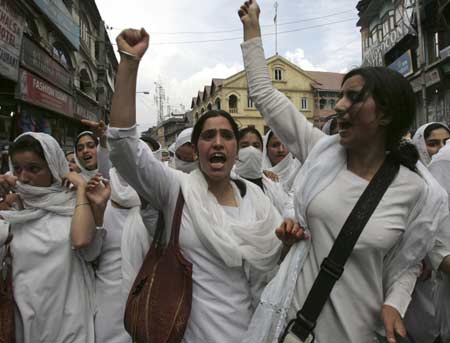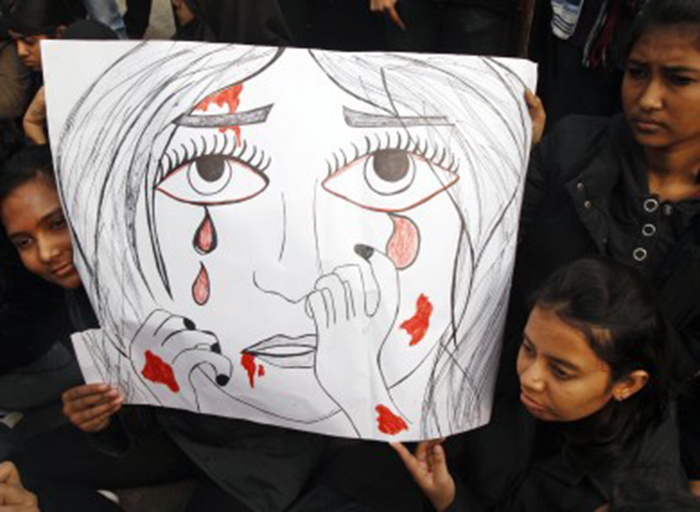The daughter of one of Kashmir’s most prominent politicians has pleaded with the international community to act over an unprecedented clampdown on millions of people in the territory, warning that Kashmiris are being “caged like animals” and treated as “cannon fodder”.
Speaking to the Guardian while under house arrest, Iltija Mufti, the daughter of the former chief minister Mehbooba Mufti, said as many as 25 armed security personnel had surrounded her house last week. All entrances to the house have been locked, she said, defying a communications ban by the Indian government.
Mufti said no legal basis had been provided for her detention but she had been told her previous comments to the media, criticising India’s actions in Kashmir, had angered officials. She said she had been denied a lawyer and prevented from seeing visitors.
Her mother was placed under house arrest hours before the Indian government made a dramatic announcement on 5 August that it would withdraw Kashmir’s special status. She is understood to have been taken to a makeshift jail. About 500 people have reportedly been detained, ostensibly to prevent unrest.
Mufti said she feared that speaking to the media might result in her being jailed, but she had chosen to call for action before a closed-door UN security council meeting on the matter, expected to be held on Friday.
“I’ve quite clearly been told: first of all we make sure you don’t get your voice out, and you’re not heard, and if you do, be ready to suffer the consequences,” said Mufti, who managed to speak to the Guardian from her home. “Those consequences will be that you will be detained indefinitely and that I won’t have the right or access to even a lawyer.
I feel really scared for my life. I don’t think I am safe any more because I don’t trust this government. The way they have gone after even elected representatives is quite frightening.”
Her mother had argued in favour of a shared future with India – a view many in Kashmir believe has now been completely discredited.
Delhi’s decision strips the disputed state of Kashmir and Jammu of any elements of autonomy, removing its constitution and flag, and scrapping laws that prevented outsiders from buying land. The state will also be split in two. Many Kashmiris believe the changes pose an existential threat, and the demography of the country’s only Muslim-majority state will be altered.
Quick guide
Kashmir
Show
On Friday, the Jammu and Kashmir chief secretary, BVR Subrahmanyam, said “a few preventive detentions” of individuals had been made, “in accordance with the provisions of the law”.
He also said restrictions on landlines would be eased over the coming days. It is not clear when mobile phone services will be restored.
Millions of people across Kashmir have been under an unprecedented communications blackout since 5 August, with no internet, mobile or landline services, as part of measures described by a UN official as draconian.
There are fears for the most vulnerable residents in Kashmir. Mufti said people in the state were being treated as “cannon fodder”, did not have access to medical supplies and were probably running out of food.
“Let them go, let them free,” she said.
Kashmir is a volcano waiting to erupt, she said. “There’s palpable anger … the day this curfew is lifted I feel like all that anger is going to spill out on to the streets of Kashmir. And it’s not going to be good.
“People are so angry. They are fuming at the way they were stripped of their rights … and to add insult to injury you have tied them up like they are animals. But they are not animals; they are humans beings,” she said.
The communication blocks had debilitated an entire population, she added. “Not only have they massacred our state and cleaved it into two parts, they have also stripped us of our dignity.”
Subrahmanyam said that 12 of the 22 districts of the state were functioning normally with some limited night-time restrictions in five of these. However, communication blocks mean it is not possible to independently verify this.
He added that restrictions would be lifted in the next few days, with some schools opened after the weekend. Restrictions on movement would be removed on an area-by-area basis, he said.
On Thursday, Mufti wrote to India’s home minister, Amit Shah, asking under what legal grounds she had been detained. “Is it a crime to articulate the pain, torment and indignity we’ve been subjected to?” she wrote.
Outside her home, Mufti said, a military van waits at the front gate. “Every time that I step out into the garden for fresh air there is a man who intercepts them on a walkie talkie and lets them know that I’ve stepped out,” she said. Three to four female officers, who she believes are there to grab her if she attempts to run, were also present.
It is more than 11 days since her mother was arrested.
“I miss her terribly and there are times when I dream of her and imagine us in happier times.” India can no longer claim to be the world’s largest democracy, she said: “Not after what Kashmiris have had to endure in the past two weeks.”













![A new trend in Kashmir is the attendance of a large number of Kashmiris in the funeral procession of rebels killed by Indian forces. Media reports say at least 160 rebels were killed in encounters this year across Kashmir. [Sameer Mushtaq/Al Jazeera]](https://www.aljazeera.com/mritems/Images/2018/10/24/e58c1885239b40bb908bceeea754adee_8.jpg)
![Kashmiri women bear a major brunt of the ongoing armed conflict in the region. Hundreds of them have been widowed and displaced, while allegations of torture, rape and forced detention by Indian forces are often made by Kashmiri groups. [Sameer Mushtaq/Al Jazeera]](https://www.aljazeera.com/mritems/Images/2018/10/24/50e51ef8ec69448cbb3fac8c8d2cc306_8.jpg)
![Indian soldiers after the killing of five rebels in Qazigund area in South Kashmir last month. India has stationed nearly 700,000 troops in the Himayalan region, making it the world's most militarised conflict zone. [Sameer Mushtaq/Al Jazeera]](https://www.aljazeera.com/mritems/Images/2018/10/24/195a3c08989a4a5ab83c52233202adc7_8.jpg)
![Locals allege this house in Khudwani area of South Kashmir was burnt down by the Indian security forces during an encounter in April. Four civilians were killed in the protest that followed. [Sameer Mushtaq/Al Jazeera]](https://www.aljazeera.com/mritems/Images/2018/10/24/f614f209e7e141cb913cf49182584167_8.jpg)
![A boy gathers bullet shells following a gun battle. Experts have warned of grave effects of the decades-old conflict on Kashmir's children. [Sameer Mushtaq/Al Jazeera]](https://www.aljazeera.com/mritems/Images/2018/10/24/1da6eb378c5f4289aecb82e02f847791_8.jpg)
![A Kashmiri protester throws stones at Indian police and paramilitary forces. Stone pelting has now become a norm in Kashmir as tear gas shells, pellets and sometimes even live bullets are used against the protesters. [Sameer Mushtaq/Al Jazeera]](https://www.aljazeera.com/mritems/Images/2018/10/24/5632470b1f2e4a6da247aa17037f98bb_8.jpg)
![Asif Rasid, a class 6 student, lost one of his eyes in a pellet attack. 'I went to a nearby shop when stone pelting was on. I got stuck in the tear gas smoke and my eyes were hit by pellets,' he said. 'My life has completely changed. I am unable to study or even see anything on the black board. Even after two years, I feel pain as pellets remain in my body.' [Sameer Mushtaq/Al Jazeera]](https://www.aljazeera.com/mritems/Images/2018/10/24/9843542886734fafa17ccc6da791d887_8.jpg)
![Tributes being paid to policemen who were abducted and killed by rebels in South Kashmir, another recent trend. Nearly 40 policemen were killed across Kashmir this year. [Sameer Mushtaq/Al Jazeera]](https://www.aljazeera.com/mritems/Images/2018/10/24/dead2749a02f4a83b83f601585889ab3_8.jpg)
![The funeral prayers of a Kashmiri army man Manzoor Ahmad, killed by rebels during an attack on an army base in Jammu region. [Sameer Mushtaq/Al Jazeera]](https://www.aljazeera.com/mritems/Images/2018/10/24/9a174870071a4536993a2aa06ac6dba6_8.jpg)
![Naseema Bano lost her rebel son earlier this year. Tauseef was associated with Lashkar-e-Taiba, a prominent armed group in Kashmir. 'I miss my son. I wish he was with me, but such is the destiny of thousands of mothers like me in Kashmir,' she said. [Sameer Mushtaq/Al Jazeera]](https://www.aljazeera.com/mritems/Images/2018/10/24/c7cde6aa0cdc4d8d839964eab236b7e3_8.jpg)
![A wounded boy being taken to hospital after a live shell lying in the rubble of an encounter site went off in Kulgam district last week. Seven civilians died and 30 were injured as they were dousing the flames of a house where the gun battle took place, in which three rebels were also killed. [Sameer Mushtaq/Al Jazeera]](https://www.aljazeera.com/mritems/Images/2018/10/24/d4d349d50e994d3888170ef343bbb3a9_8.jpg)
![The sister of Mohammad Muqeem holding his photograph in Kulgam's Laroo village. Muqeem, a class 12 student, was one of the seven civilians killed on October 21. 'He had to appear in his board examination four days later. I never expected that he would meet this fate,' a relative of Muqeem said. [Sameer Mushtaq/Al Jazeera]](https://www.aljazeera.com/mritems/Images/2018/10/24/d0d4062aad944168a01cdeabb583eb9f_8.jpg)
![Another funeral procession of a slain rebel attended by hundreds of Kashmiris. Instances of people surrounding encounter sites and throwing stones on Indian troops to allow trapped rebels to escape have increased in recent years. [Sameer Mushtaq/Al Jazeera]](https://www.aljazeera.com/mritems/Images/2018/10/24/d17865673bc1409580fcd09c55a14d90_8.jpg)



